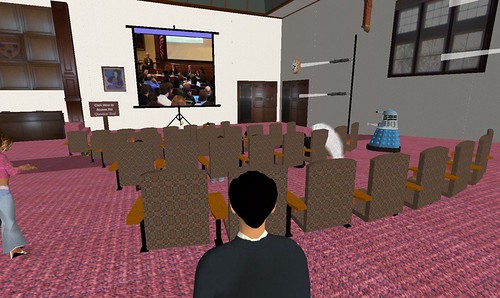There are so many cool things in Fred Stutzman’s recent post, but this point rang the bell for me just as I was considering the differences between World of Warcraft and Second Life. More on those games in a moment, first let’s get Stutzman’s description of ego vs. object networks:
An ego-centric social network places the individual as the core of the network experience (Orkut, Facebook, LinkedIn, Friendster) while the object-centric network places a non-ego element at the center of the network. Examples of object-centric networks include Flickr (social object: photograph), Dopplr (social object: travel instance), del.icio.us (social object: hyperlink) and Digg (social object: news item).
But how are they really different?
the problem with ego-centric networks lies in the fact network-reestablishment is the main chore. Talk to individuals joining Facebook today – what are they doing? They’re using inbox importers and searching to find their friends/ex-classmates/etc. It’s a game, it’s fun for a bit, but then (say it with me readers) “What’s next?” Yes, the what’s next moment occurs. This is not to say the network becomes useless: no, it’s very useful rolodex, and the newsfeeds introduce concepts of peripheral participation (or social surveillance), but the game is in essence over.
All of this relates to World of Warcraft (WoW) and Second Life (SL) in that WoW offers the framework of a game, with new items to be found and new quests to be explored. WoW is a social experience, to be sure, but it centers on those quests. SL, on the other hand, is “a 3-D virtual world entirely created by its Residents.” Thing is, who can argue with this statement: “MySpace is a 2-D virtual world entirely created by its residents.”
I’m technically amused and interested in the affordances SL offers for remixing the experience, and some users have demonstrated that it could become object based, as Stutzman uses the term. But, for now, I’d argue that it’s a far more ego-centric experience. People pay to participate in SL, so it’s unlikely that people make a mass exodus as MySpace users have, but what’s driving outsiders to join?
I’ll admit that I’m the guy who long ago praised the description of IM as “all the interruptions of a phone call with all the frustrations of typing,” (though I can’t remember where I read the quote), and now I describe it as an essential business tool. As a realtime distance ed environment SL can’t be beat, and I can imagine something like a chemistry lecture where the instructor brings in 3-D models of various compounds, highlighting elements during a short lecture, then students highlighting other elements (or bringing in other compounds) during their questions. I just can’t imagine another reason for me spend time there, though, as always, I reserve the right to change my opinion.
